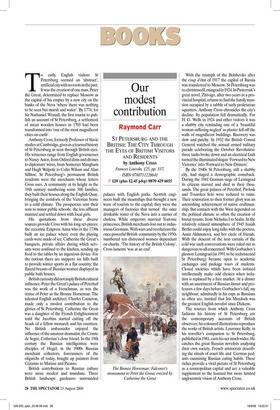Our modest contribution
Raymond Carr
ST PETERSBURG AND THE BRITISH: THE CITY THROUGH THE EYES OF BRITISH VISITORS AND RESIDENTS by Anthony Cross Frances Lincoln, £25, pp. 337, ISBN 9780711228641 ✆ £20 (plus £2.45 p&p) 0870 429 6655 To early English visitors St Petersburg seemed an ‘abstract’, artificial city with no roots in the past. It was the creation of one man, Peter the Great, determined to replace Moscow as the capital of his empire by a new city on the banks of the Neva ‘where there was nothing to be seen but marsh and water’. By 1774, for Sir Nathaniel Wraxall, the first tourist to publish an account of St Petersburg, a settlement of mean wooden houses in 1703 had been transformed into ‘one of the most magnificent cities on earth’.
Anthony Cross, formerly Professor of Slavic studies at Cambridge, gives us a learned history of St Petersburg as seen through British eyes. His witnesses range from English governesses to Nancy Astor, from Oxford dons and divines to diplomats’ wives, from Somerset Maugham and Hugh Walpole to Colin Wilson and Alan Sillitoe. St Petersburg’s permanent British residents were the merchants whose letters Cross uses. A community at its height in the 19th century numbering some 500 families, they built their houses along the English Quay, bringing the comforts of the Victorian home to a cold climate. The prosperous sent their sons to minor public schools; the less affluent married and settled down with local girls.
His quotations from these diverse sources provide Cross with his long set-pieces: the eccentric Empress Anna who in the 1730s built an ice palace where even the playing cards were made of ice; Catherine the Great’s banquets, private affairs during which servants were confined to the kitchen, sending up food to the tables by an ingenious device. For the curious there are snippets: ice hills built to provide winter sports in a flat country; the flaccid breasts of Russian women displayed in public bath houses.
British curiosity did not imply British cultural influence. Peter the Great’s palace of Peterhof was the work of a Frenchman, as was the statue of Peter as the Bronze Horseman. The talented English architect, Charles Cameron, made only a modest contribution to the glories of St Petersburg. Catherine the Great was a daughter of the French Enlightenment until the Jacobins started cutting off the heads of a fellow monarch and his courtiers. No British ambassador enjoyed the influence of the amateur dramatist, the Comte de Segur, Catherine’s close friend. In the 19th century the Russian intelligentsia were disciples of Hegel; in the 1900s Russian merchant collectors, forerunners of the oligarchs of today, bought up painters from Cézanne to Matisse and Picasso.
British contributions to Russian culture were more modest and mundane. Three British landscape gardeners surrounded palaces with English parks. Scottish engineers built the steamships that brought a new wave of tourists to the capital; they were the managers of factories that turned the once drinkable water of the Neva into a carrier of cholera. While emperors married Teutonic princesses, British merchants lost out to industrious Germans. With wars and revolutions the once powerful British community by the 1950s numbered ten distressed women dependant on charity. ‘The history of the British Colony’, Cross laments ‘was at an end’. With the triumph of the Bolsheviks after the coup d’état of 1917 the capital of Russia was transferred to Moscow. St Petersburg was re-christened Leningrad in 1924. In Pasternak’s great novel, Zhivago, after two years in a provincial hospital, returns to find the family mansion occupied by a rabble of surly proletarian squatters. Anthony Cross chronicles the city’s decline. Its population fell dramatically. For H. G. Wells in 1924 and other visitors it was a shabby city reminding one of a ‘beautiful woman suffering neglect’ as plaster fell off the walls of magnificent buildings. Recovery was slow and patchy. In 1932 the British Consul General watched the annual armed military parade celebrating the October Revolution: three tanks broke down and an electrical fault turned the illuminated slogan ‘Forward to New Victories’ into ‘Forward to New Dinners’.
By the 1940s St Petersburg, still a shabby city, had staged a demographic comeback. During the 1941 German siege of Leningrad its citizens starved and died in their thousands. The great palaces of Peterhof, Pavlosk and Tvsarskoi Selo were reduced to ruins. Their restoration to their former glory was an astonishing achievement of native craftmanship. But contacts with the West depended on the political climate so often the creation of brutal tyrants, from Nicholas I to Stalin. In the relatively relaxed atmosphere of 1945 Isaiah Berlin could enjoy long talks with the poetess, Anna Akhmatova, and her circle of friends. With the descent of the iron curtain of the cold war such conversations were ruled out as dangerous to all concerned. With Gorbachov’s glasnost Leningrad (in 1991 to be rechristened St Petersburg) became open to academic exchanges and package tours of students. Closed societies which have been isolated intellectually make odd choices when isolation is replaced by a free market. At a dinner with an assortment of Russian literati and professors a few days before Gorbachov’s fall, my neighbour, admittedly in his cups as Russians so often are, insisted that Iris Murdoch was the greatest English novelist since Dickens.
The sources from which Anthony Cross fashions his history of St Petersburg are the contemporary accounts of British observers; his coloured illustrations reproduce the works of British artists. Laurence Kelly, in his traveller’s companion to St Petersburg, published in 1981, casts his net much wider. He catches the great Russian novelists analysing their own society, French aristocrats describing the rituals of court life and German pedants examining Russian eating habits. These riches provide a vivid picture of St Petersburg as a cosmopolitan capital and are a valuable supplement to the learned but more limited anglocentric vision of Anthony Cross.


























































 Previous page
Previous page